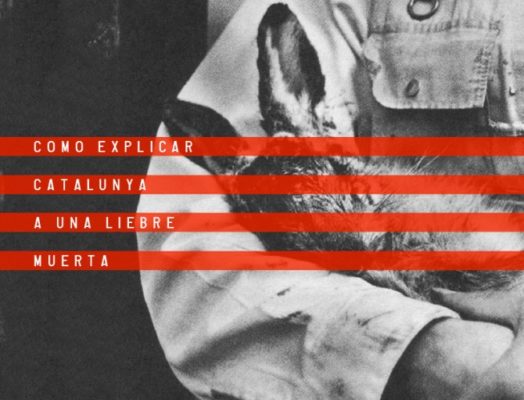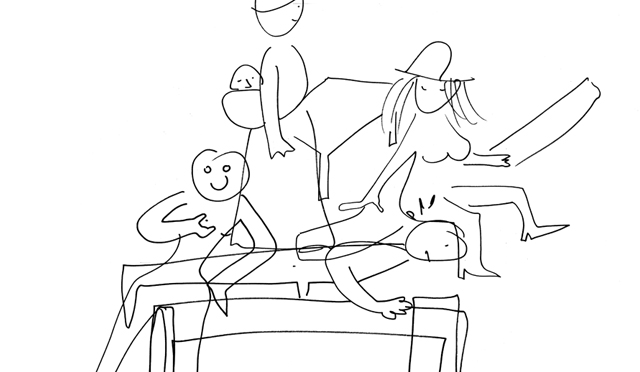Search
To search for an exact match, type the word or phrase you want in quotation marks.
A*DESK has been offering since 2002 contents about criticism and contemporary art. A*DESK has become consolidated thanks to all those who have believed in the project, all those who have followed us, debating, participating and collaborating. Many people have collaborated with A*DESK, and continue to do so. Their efforts, knowledge and belief in the project are what make it grow internationally. At A*DESK we have also generated work for over one hundred professionals in culture, from small collaborations with reviews and classes, to more prolonged and intense collaborations.
At A*DESK we believe in the need for free and universal access to culture and knowledge. We want to carry on being independent, remaining open to more ideas and opinions. If you believe in A*DESK, we need your backing to be able to continue. You can now participate in the project by supporting it. You can choose how much you want to contribute to the project.
You can decide how much you want to bring to the project.

At A*DESK we have only a few principles. And these few principles that we believe in are very basic. We believe in the transformative and critical capacity of individuals. We believe in a free culture that traverses frontiers. And we like remembering that Dadaist motto that proposed shitting in different colours on the flags of all the consulates.
Beyond these principles, we don’t like to be guilty of excessive ingenuity. We also don’t believe that cultural processes are at the margins of social and political realities. In other words, if artistic and cultural practices make any sense it is in managing to drag them beyond their own conceit. A conceit, which on many occasions is self-protecting, that despite well-intentioned, social and political discourses seeks a safe refuge, from where to remain on the high and dry. A conceit, that conceals a form of complicity with the dynamics of the late-capitalist market, and the policies that govern the current neo-conservatism. But at times this leads us to want to think about some political and social processes through culture and art, about current processes that affect our lives in an explicit manner or that we hear about in the media, in the face of which culture remains mute. This is the case of the socio-political process that has been explicitly opened up over the last year in Catalonia. A process, that places in tension the desire for independence, sovereignty, federalism, with the continuity of the current status quo. In any case a process that discusses and questions the relations between Catalonia and Spain.
In the face of this situation we always here the same voices: the voices of politics and journalism. Voices that warn us about the economy but pay little, if any, heed to culture. When it does appear it is strictly in terms of identity and in an almost folkloric manner.
However, we can’t forget that cultural and artistic productions arise beyond the conceit of a crystal glass and beyond a limbo of internationality. They appear and develop under a paradigm full of intersecting vectors. On the one hand strictly administrative ones: programmes for promotion abroad; relations between autonomous communities and central government; aid, grants, subventions… And on the other, contextual aspects: relations between different agents that configure a context that at times is said to be Spanish, and at others Catalan, but more often is more about Madrid, Barcelona or Bilbao or based on relations between individuals.
So what we’ve proposed to do is gather together the opinions, and points of view, on; Catalonia, Catalanism, nationalism and nationalisms, politics and also cultural and artistic productions, of a few intellectuals, critics and curators, who in some way or other have tied their practices to contemporary art and who as political subjects also find themselves affected by the process that was initiated a year ago. But it has not been easy. Rather than the marked enthusiasm surrounding the figures of those participating in demonstrations for the right to decide or for independence, there seems to be a widespread despondency, fatigue, or even exhaustion in the artistic community, perhaps due to the awareness that everything will be, or has already been, reduced to flags and shit. Hence the proposal of Oriol Fontdevila for an Anti-anti-Catalanism, in line with the anti-anti-communism proposed by Sartre; the evaluation of the symbolic character that is almost in tune with the “Catalans, you are drowning in aesthetics” that Martí Manen remembers; the need for a critical revision of a Catalan culture of art, proposed by Joan M. Minguet or in a broader analytical framework, by Peio Aguirre, from the Basque Country; or the revision by Juan Canela and Eloy Fernández Porta of some artistic productions that have explored the question of identity and nationalism; and finally the awareness of a political defeat or the setting in motion of a form of anti-anti thinking by Martí Peran.
In this context, the dead hare of Joseph Beuys, to which we allude with the title of this edition, could be that of Catalonia itself, Spain obviously, undoubtedly that of institutional politics, clearly the global economic context and in effect, the very deaf-mute that is art itself.

A*DESK is a critical platform focused on publishing, training, experimentation, communication and dissemination in relation to contemporary culture and art, which is defined by transversality. The starting point is contemporary art, because that is where we come from and this awareness allows us to go much further, to incorporate other disciplines and forms of thought in order debate issues that are relevant and urgent for understanding our present.
"A desk is a dangerous place from which to watch the world" (John Le Carré)